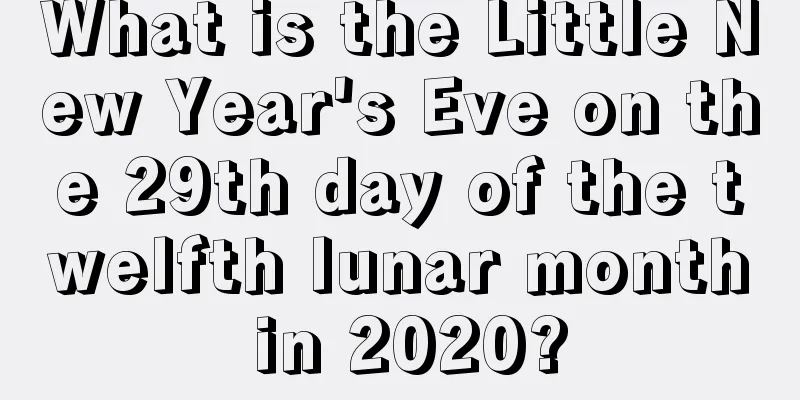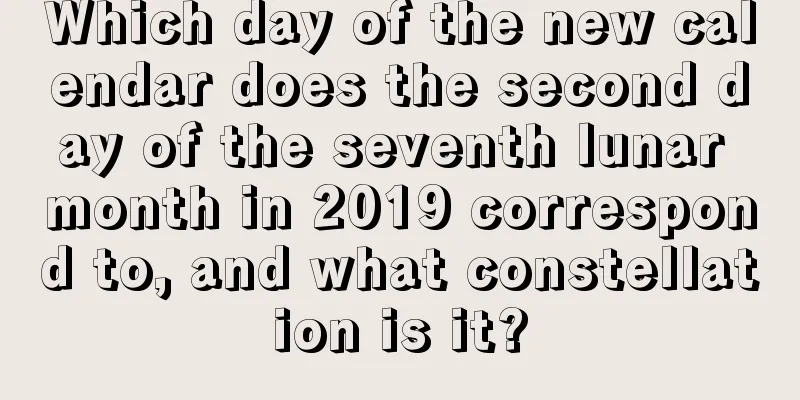What is the Little New Year's Eve on the 29th day of the twelfth lunar month in 2020?

Introduction: It’s the end of the year again and one of the important festivals in the lunar calendar is New Year’s Eve. People call the day before New Year’s Eve "Little New Year’s Eve". So is the Little New Year’s Eve on the 29th day of the twelfth lunar month in 2020 a good day? Follow the editor to learn more about it! The twelfth month of the lunar calendar marks the beginning of a new year. Mr. Shui Mo will meet with you in the twelfth month of the lunar calendar in 2020 to discuss the good and bad omen for the new year.How is the New Year’s Eve on the 29th day of the twelfth lunar month in 2020?Lunar calendar: December 29, 2020 Gregorian calendar: February 10, 2021, Wednesday, Aquarius [Today's old almanac is suitable] [Do not use it for important events on the day] Recruiting a son-in-law, seeking wealth, offering sacrifices, traveling, entering school, seeking a partner [Today's old almanac is unfavorable] [Do not use it for important events on the day] Setting up the bed, breaking ground, funeral, burial, building, breaking ground, buying property, building embankments, releasing water, seeking medical treatment, taking office, accepting marriage, praying for blessings, seeking offspring, shipping, raising beams, erecting pillars, starting drilling, canceling marriage, moving into the house, separating and sailingAccording to the old almanac, since this day belongs to the "red-veil day, do not use it for important events", the New Year's Eve on the 29th day of the twelfth lunar month in 2020 is not an auspicious day! What is Little New Year's EveNew Year's Eve refers to the last night of the twelfth lunar month of each year, which is connected to the Spring Festival (the first day of the first lunar month).The word "chu" in "Chuxi" means "to go; to change; to alternate". Chuxi means "the end of the month and the year". People have to get rid of the old and welcome the new. It means that the old year is over and the new year will come. It is the last night of the lunar calendar. Therefore, the activities during this period are centered around getting rid of the old and bringing in the new, eliminating disasters and praying for blessings. During the Zhou and Qin dynasties, at the end of each year, a "Dannu" ceremony was held in the imperial palace, in which drums were beaten to drive away the plague demons. This was called "Zhu Chu". Later, the day before New Year's Eve was called Xiao Chu, or Little New Year's Eve, and New Year's Eve was called Da Chu, or Big New Year's Eve. The 28th or 29th day of the twelfth lunar month, the day before New Year's Eve, is called Little New Year's Eve, a Chinese folk culture. On this day, families hold banquets and people visit each other to say goodbye to the old year. Burning incense outdoors is called "tianxiang" and usually lasts for three days. Steps for choosing an auspicious dayFirst of all, an auspicious day refers to the day when the six gods "Qinglong, Tiande, Yutang, Siming, Mingtang and Jinkui" are in the place.Use the Eight Characters to choose auspicious days . Use your own year-long stem and branch information and the day's five elements stem and branch information to perform calculations, eliminate the days that are bad for you due to conflict, restraint, punishment, and harm, and choose good days that are helpful to you. Then filter out the folk taboo days. There are many folk taboo days in different places. Only the most important ones are listed below. It is best to avoid the following days when choosing a date. ① Four Li Days: The day before the Spring Equinox, Autumnal Equinox, Summer Solstice and Winter Solstice among the 24 solar terms is called the Li Day. There are four departure days in a year. ② Four Absolute Days: The day before the Beginning of Spring, Beginning of Summer, Beginning of Autumn and Beginning of Winter in the 24 solar terms is called the Absolute Day. There are four absolute days in a year. ③Four waste days: Spring: Gengshen and Xinyou days. Summer: Ren Zi and Gui Hai days. Autumn: Jiayin and Yimao days. Winter: Bingwu and Dingsi days. ④ Ten evil days: If the days fall on Jiachen, Yisi, Bingshen, Dinghai, Wuxu, Jichou, Gengchen, Xinsi, Renshen and Guihai, they are the ten evil days. ⑤ Three Niangsha Days: The third day is Gengwu day, the seventh day is Xinwei day, the thirteenth day is Wushen day, the eighteenth day is Jiyou day, the twenty-second day is Bingwu day, and the twenty-seventh day is Dingwei day, for a total of six days. The probability of this happening will not be too high. ⑥ Yang Gong’s Death Anniversary: It is said to have been set by Yang Yunsong, the Feng Shui master in the Tang Dynasty. In the eyes of the Xuankong family, it is not appropriate to do big things during these thirteen days. Determine the daily do's and don'ts according to the "construction and division method" and make your choices. How can one find the destined one in such a vast sea of people? When will the marriage begin? Welcome to click on the "Premium Calculation" below to make predictions in advance. I wish you find your destined person soon! |
Recommend
Is August 20th of the lunar calendar in 2022 a good day to get engaged?
The eighth month in the lunar calendar is the You ...
Is the fourth day of the fourth lunar month in 2022 a day of underworld? Can’t I propose marriage on that day?
The lunar calendar days can be divided into auspic...
What is the nickname of the second month in the lunar calendar? What month is it called? What should we pay attention to?
The second month of the lunar calendar has had man...
Can I visit the graves and worship my ancestors on the 16th day of the first lunar month?
By referring to festivals such as the Ghost Festiv...
What are the characteristics of light snow weather? Tips for keeping warm during the Xiaoxue in 2020
Xiaoxue is the 20th solar term in the 24 solar ter...
Is April 24th of the lunar calendar in 2018 a suitable date for decorating the house?
Introduction: According to Chinese tradition, ausp...
Is it suitable to get a haircut on February 27th of the lunar calendar in 2018?
Introduction: Human hair needs to be trimmed when ...
Will we welcome the God of Wealth on the 25th day of the twelfth lunar month in 2019? What should we pay attention to when welcoming the God of Wealth?
Will we welcome the God of Wealth on the 25th day ...
Is it suitable to travel on the tenth day of the eighth lunar month in the Year of the Rat 2020?
Is it suitable to travel on the tenth day of the e...
When does the Beginning of Autumn come? Will it still be hot after the Beginning of Autumn in 2019?
The Beginning of Autumn means that the summer heat...
What are the do's and don'ts on the fifth day of the ninth lunar month in 2019? What are the precautions?
What are the do's and don'ts on the fifth...
Is the tenth day of the seventh lunar month in 2017 a suitable day to go to the temple to burn incense and worship Buddha?
Introduction: Many people have always firmly belie...
Is it good to get pregnant and give birth in Guyu in 2018? Is it good to be born in Guyu?
Introduction: Pregnancy and childbirth are major e...
What day is the eighth day of the fifth lunar month in 2017? What month and date is it?
The fifth month of the lunar calendar is the Drag...
Is the Lantern Festival Chinese Valentine's Day? Why is the Lantern Festival called the Chinese Valentine's Day?
Introduction: The Lantern Festival is not only an ...









